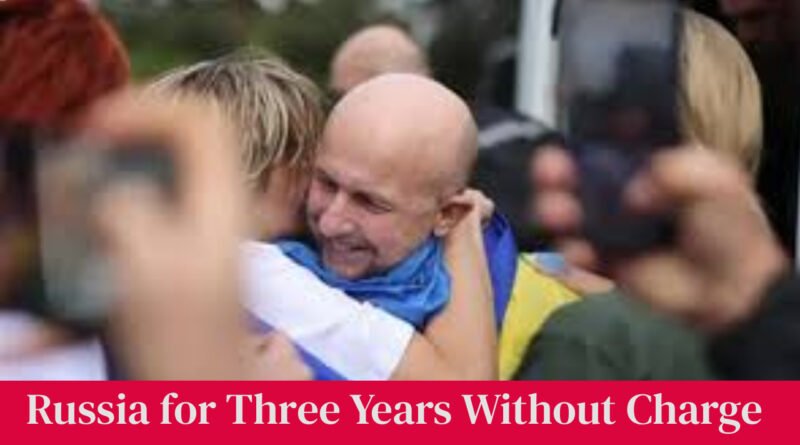Held in Russia for Three Years Without Charge
The story of Dmytro Khyliuk is a harrowing testament to the silent suffering of thousands of Ukrainian civilians caught in the gears of a war they did not choose. A journalist by profession, Dmytro’s life was violently upended in the first days of Russia’s full-scale invasion. Detained by Russian forces, he endured an ordeal that would last three years in captivity, a period marked by uncertainty, brutality, and a complete absence of legal procedure. His recent release in a rare prisoner swap involving civilians offers a glimmer of hope, yet it underscores a devastating and ongoing crisis: the thousands of Ukrainians still illegally held in Russia for three years or more, their fates unknown to their grieving families.
Dmytro’s nightmare began in his peaceful village of Kozarovychi, just outside Kyiv. As Russian forces advanced on the capital in 2022, they occupied his hometown. While assessing the shrapnel damage to his family home, Dmytro and his father, Vasyl, were seized. Russian troops forced them to the ground, bound and blindfolded them, and marched them away. Their first prison was a dank basement beneath local warehouses the Russians had commandeered. This was merely the beginning of a long journey into the heart of Russia’s penal system, a journey undertaken without cause or charge. The initial transfer was brutal; he describes being beaten with rubber batons by soldiers who hurled accusations at him. This constant cruelty would become a hallmark of his captivity for three years, a period where the basic tenets of human rights were systematically denied.
Life inside the various Russian detention facilities was a relentless test of physical and mental endurance. The first year was the most physically grueling, characterized by deliberate starvation. Rations were so meager that Dmytro lost over 20 kilograms in a matter of months, suffering from debilitating dizziness. The psychological torment, however, was constant. Guards would unleash attack dogs on the prisoners, and Dmytro himself was bitten and left bleeding. He witnessed far worse fates befall captured Ukrainian soldiers, who were regularly taken for “interrogations” that involved brutal beatings and torture with electric shocks. The sound of their pain and the sight of their bruises were a daily reminder of the arbitrary violence that defined their existence. Throughout this entire time, in Russia for three years, he was never formally charged with a crime, never presented with evidence, and never allowed a fair trial—a clear violation of international law.
For Dmytro’s family, the anguish was a different kind of prison. His elderly and unwell parents were left with a terrifying void of information. After Vasyl was unexpectedly released, he lived with the trauma of his own detention and the fear for his son’s life, having heard gunshots in the night and witnessed men being taken away never to return. The family received only two tiny scraps of paper from their son during his entire time held in Russia for three years. Each note, assuring them he was alive, was a precious but agonizingly brief connection. His mother, Halyna, embodies the emotional toll of this waiting; she can barely speak his name without tears, overwhelmed with joy at his return but forever scarred by the long years of fear and uncertainty.
Tragically, Dmytro’s story is not unique. He represents a vast and shadowy crisis. Official Ukrainian sources state that over 16,000 civilians are currently missing, with a significant number believed to be held in Russian prisons. Moscow refuses to publish lists or acknowledge these detainees, as holding civilians without cause is illegal under international law. This illegality is precisely what makes securing their release so complex. As Ukraine’s human rights ombudsman, Dmytro Lubinets, explains, Ukraine is bound by the rules of war and holds no Russian civilian prisoners to exchange. Swapping soldiers for civilians would create a perverse incentive for Russia to take even more hostages. This leaves families like that of Volodymyr Loburets—detained alongside Dmytro and still missing—in a desperate limbo, waiting for a political solution that seems perpetually out of reach.
Dmytro Khyliuk is now free, frantically catching up on the life he lost and making calls to the families of those he met in captivity, offering them the first confirmation that their loved ones are alive. But his return home is to a different reality. The war continues, with drones threatening the skies above Kyiv. The physical and psychological scars of being held in Russia for three years will take a long time to heal. His story is one of incredible resilience, but it is also a urgent call to the world to remember the thousands of other Ukrainian civilians for whom the ordeal of illegal detention continues, their freedom hanging in the balance of a conflict that shows no sign of abating.
Go To Main Page

